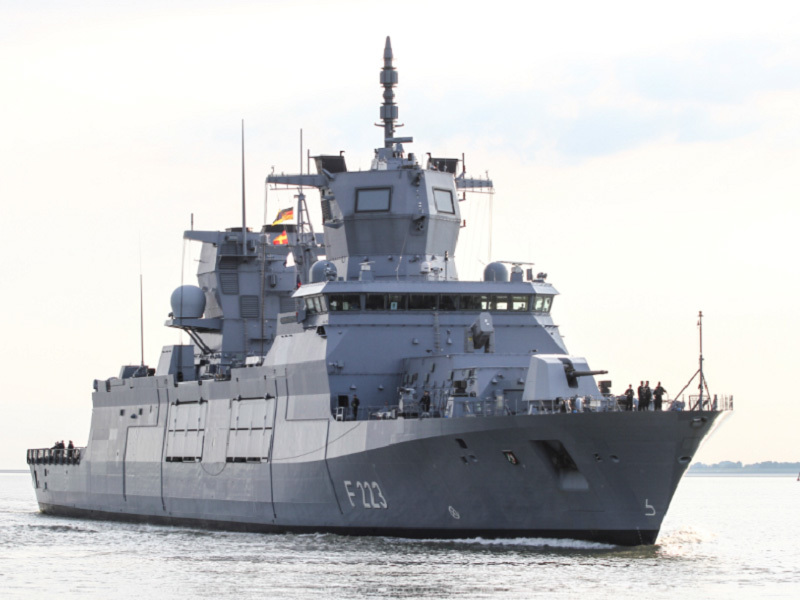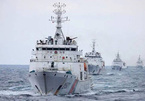This is a remarkable move as Germany is gradually changing its strategy and outlook towards the Indo-Pacific, where Germany has no overseas territories the UK or France.
 |
|
Nordrhein-Westfalen, one of the four of Baden-Wurttemberg corvette class vessels of the German Navy. Photo: Naval Today
|
The plan was announced in the first week of Biden's presidency, when the United States was sending a group of Roosevelt combat aircraft carriers to the East Sea (internationally known as the South China Sea), at the same time ad China’s approval of the Coast Guard Law, which allows its coast guard forces to open fire against ships of foreign countries believed to violate waters under China's sovereignty and jurisdiction.
This law will seriously limit the freedom of navigation rights of other countries, including Germany, when most of the waters in the East Sea claimed by China are not consistent with the 1982 UN Convention on the Law of the Sea (UNCLOS).
Strong commercial relationship
Germany and China have had a close relationship, especially on trade, since Prime Minister Helmut Kohl's time, who once said: "China holds the key to Germany's long-term prosperity."
China is Germany's third largest export market, after the US ($132.8 billion) and France ($119.5 billion), according to 2019 statistics. German exports to China was $107.5 billion, accounting for more than half of the total value of EU exports to China.
In 2020, when trade transactions between the US and China plummet due to the Covid-19 pandemic and the trade war, the value of German exports to China still remained to the level of the pre-crisis time. China still had a trade surplus with Germany, amounting to $15.2 billion. This country is still an important pillar of the German economy.
For many years, China has used the economic key that Helmut Kohl referred to "lock Germany" from taking decisive action against its coercion of small countries in the East Sea. Germany's attitude and policy toward China strongly influenced policy of the EU, especially in the context of Britain's exit from the EU.
More vigilant with China
Germany's decision to send warships into the East China Sea and the East Sea should be seen as a turning point in the geopolitical dispute between the US and its allies with China. It happened at a time when Germany was about to have a new Prime Minister. This is a new step in implementing the Indo-Pacific strategy that Germany just passed in September 2020.
The same month, for the first time, Germany, the UK and France, the three major European countries, issued a joint note condemning China's claims that are inconsistent with UNCLOS in the East Sea, rejecting the application of the archipelagic baselines for offshore island groups belonging to coastal countries, calling on relevant countries to comply with the PCA’s 2016 ruling and saying that freedom of navigation and overflight over the East Sea should be respected.
Dealing with aggressive actions that aim to disrupt the rules-based order requires cooperation and detailed strategy among countries instead of a "flexible and pragmatic" approach from each country.
Germany is joining the United States, Japan, France and the UK to pursue a more sensible, reasonable policy for an open China.
Germany's growing attention to the open market and law-based order in the Indo-Pacific is a signal that Germany's longstanding stance on strengthening economic ties with China while avoiding opposition in political affairs is over.
This decision stems from its own interests. Germany cannot stand outside the FONOP (freedom of navigation patrol) campaigns initiated by the US and supported by the UK, France and Australia. Europe needs to be more responsible for its security and not just depend on America.
The activities of German warships in the East China Sea and East Sea also aim to strengthen cooperation relations with regional countries, especially ASEAN, against acts of the use of force and the threat of using force, contributing to ensuring security and peace for the region and the world.
Nguyen Hong Thao

Passing the Coast Guard Law, China ‘probes’ the new US administration
China’s Coast Guard Law took effect only two days after Mr. Biden took office as US President.

Japan, UK voice concern over East Sea, East China Sea situation
Four ministers from Japan and the UK on February 3 voiced serious concern about the situation in the East Sea (South China Sea) and East China Sea and opposed any unilateral attempts to change the status quo, according to Reuters.